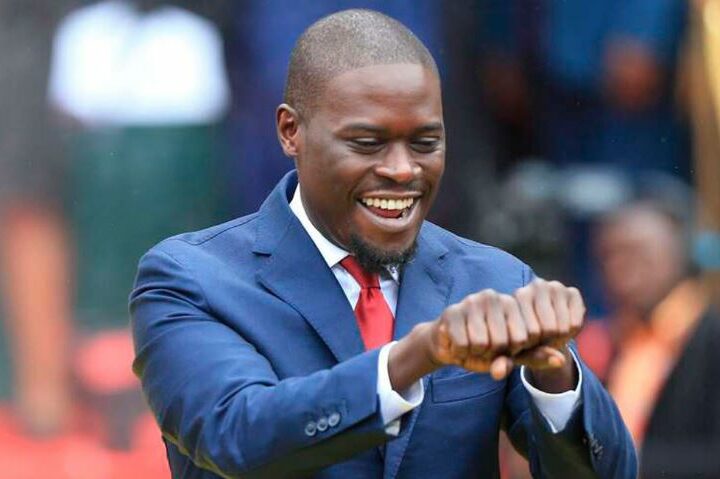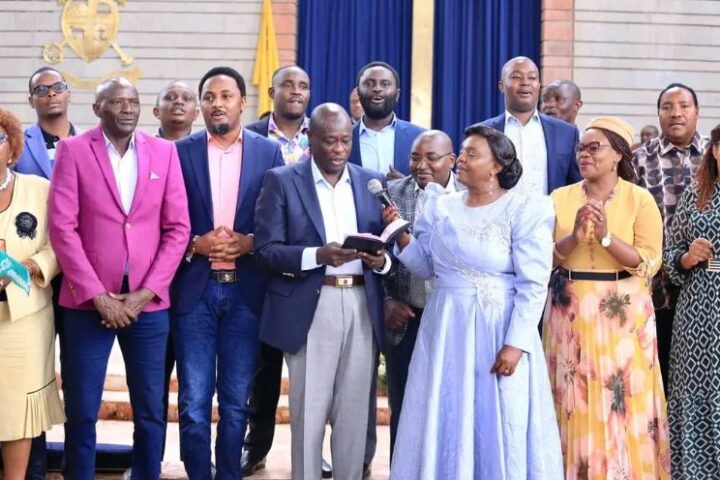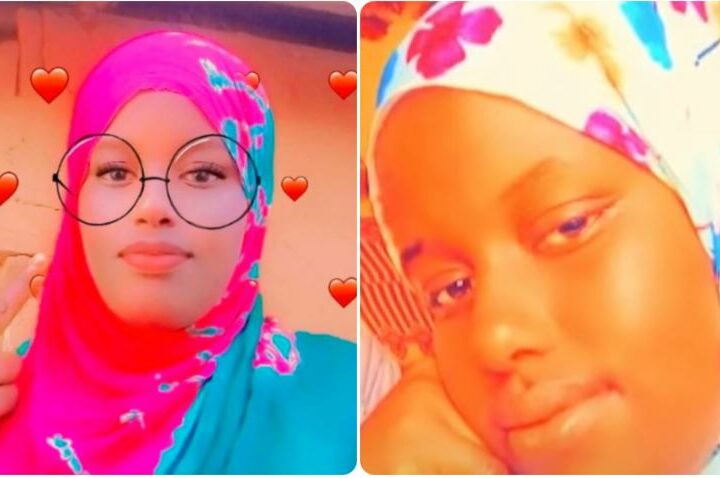 Kenneth Okoth, 39, tells his inspiring story of how he rose from the throes of despair after the death of his parents to become a manager at Grand Forest Japan Hospital Ltd, a Diagnostic Centre in Upper Hill. Nairobi.
Kenneth Okoth, 39, tells his inspiring story of how he rose from the throes of despair after the death of his parents to become a manager at Grand Forest Japan Hospital Ltd, a Diagnostic Centre in Upper Hill. Nairobi.
“I was born in Homa Bay County in 1980 — I am a firstborn in a family of three children. We were poor, my parents struggled to educate us and provide for our other needs. My father was an electrician while my mother plaited hair for a living.
When I was in primary school, we all packed our belongings and moved to Nairobi, where my parents hoped to make a better living. We got a house, (a room to be specific) in Dandora Phase Four and I joined Tom Mboya Primary School, a walking distance from our house.
Unfortunately, the improved livelihood my parents were searching for did not materialise. If anything, life was more difficult here, so we all trooped back to the village.
My parents were however determined to educate me, and therefore they enrolled me at the nearby Kamolo Primary School. I was in Class Two then.
In August 1995, just before I sat for my Kenya Certificate of Primary School examinations (KCPE), my mother died.
Her death spelt doom over my family because she had been the breadwinner. I was devastated by her death, and my hope of joining secondary school faded away.
HEAD BOY
Hard-hit by my mum’s death, I did not perform as well as I had expected, managing 380 marks out of the possible 700.
Thankfully, my aunts Abigael Akoko and the late Elizabeth Ouma, as well as a cousin, Charles Akal, paid my school fees at Dandora Secondary School in Nairobi.
Being a day scholar, I lived with my aunt Abigael, her husband and their son. After school in the evening, I would assist her to sell fish and do house work.
I stood out at my new school, determined to perform well in my studies and go to university.
While in Form Three, I was appointed class prefect, and when I got to Form Four, I was appointed head boy and chair of the Science Club.
In August 1999, just before I sat for the Kenya Certificate of Secondary Education examinations (KCSE), my father died.
Just like my mother’s death, my father’s death disoriented me. My siblings and I were now orphans, forcing our relatives to take us in.
We ended up being separated, living with different relatives. I completed high school, but to my disappointment, managed grade C, meaning I could not study medicine, as I had hoped.
CERTIFICATE COURSE
I was sure that this would be the end of my education and the end of my long-held dream to end the cycle of poverty in my family.
However, something compelled me to keep going, not to give up.
I therefore sought employment at the defunct Jack & Jill Supermarket, the popular supermarket that was located near OTC in Nairobi’s central business district (CBD).
I was employed as a packaging boy, earning Sh200 per day, part of which I diligently saved for eight months, putting aside enough to pay initial school fees at Nairobi Technical Training Institute in Pangani, where I studied a certificate course in medical laboratory technology.
It helped that I was still living with my aunt. I would work during the day and attend classes in the evening.
I continued saving, and when I completed the course two years later, I joined Technical University of Kenya (TUK) for a diploma in the same course.
Around this time, I found another job at then-East Africa Industries (EAI), now Unilever East Africa — my job was to pack Vaseline Jelly.
In 2006, I sought attachment at a medical facility, Medical Diagnostic Centre, located at Re-Insurance Plaza in Nairobi’s CBD.
LAB TECHNICIAN
My boss, the late Hannington Pamba, must have noticed my intense desire to learn because he took me under his wing and mentored me.
A year later, he invited me to join his NGO, International Friends of Children Healthcare Organisation (IFCHO), which was located near Adams Arcade, on Ngong Road.
At IFCHO, I worked as a laboratory technician as well as administrator, earning Sh9,000 a month.
A year later, a couple of donors, led by Isao Mori, the president of Ishinkai Yao Hospital, in Osaka, Japan, detached themselves from IFCHO and formed Child Doctor Kenya, an NGO that provided healthcare support to children living in children’s homes in Nairobi.
In 2008, I was offered a job by Child Doctor Kenya, which, being newly formed, was a small organisation.
By then, I had been married for a year. My wife Christine, whom I had met at Kenya Polytechnic, advised me to return to school to further my education.
It was a good idea, but my younger sister Damaris Otieno was in secondary school, and I was paying her school fees, and therefore it would have been a huge struggle, considering the fact that I earned less than Sh10,000.
SUPPORTIVE WIFE
Through my wife’s encouragement, however, I enrolled at the University of Nairobi for a bachelor’s degree in political science and sociology.
My wife was very supportive. She took a loan of Sh40,000 and paid the fees required for my first semester.
When I joined the university, my goal was to become a district commissioner (DC) so that I could improve the lives of people back home through delivery of the services they needed — I was also eager to serve in the government.
With a loan from the Higher Education Loans Board (Helb) and support from my wife, I completed my degree and graduated in 2010.
That same year, Kenya promulgated a new Constitution and with it, my dream to become a DC died since the position was scrapped.
The degree was not in vain, though, because I was promoted to administrator of Child Doctor Kenya.
The following year, in 2012, through the persistence of my wife, I went back to the University of Nairobi for a master of arts in project planning and management.
This is the same year that I left Child Doctor Kenya and joined another organisation, Grand Forest Japan Hospital Ltd, which is under the Dream World Healthcare Programme.
DOCTORAL STUDIES
This is where I have been working since. Part of my work involves recruiting doctors and nurses and other medical staff.
I am also involved in procurement as well as quality checks. The organisation, which started in 2012 with a staff of two, the director and I, has grown, now has 15 permanent employees and six part-time staff.
My education did not stop with my master’s degree. In 2015, I commenced my PhD in project planning and management, specialising in project planning design and implementation, again through my wife’s motivation.
This would probably have been impossible had it not been for the support I received from my employer through the staff partial scholarship programme. Besides, I was promoted to manager of the institution.
I graduated in December 2019; what a joyous day it was! My PhD research was on medical laboratory quality control systems, project resource management and performance of maternal and child healthcare programmes in my home county, Homa Bay.
In my thesis, I explored the influence of medical laboratory quality control systems on the performance of maternal and child healthcare programmes.
TEACHING OPPORTUNITIES
I also sought to establish the moderating influence of project resource management on the relationship between medical laboratory quality control systems and the performance of maternal and child healthcare programmes.
I was looking at the role of medical laboratories in reducing maternal and child deaths through early diagnosis, choosing Homa Bay as my research site due to the high prevalence of malaria and HIV/Aids.
If you’re wondering, I am already thinking of starting my postdoctoral studies. At the moment, I am not looking for a job, but opportunities to teach at the university have come knocking.
I might consider part-time teaching soon since I intend to grow in academia.
Obviously, my wife has been very instrumental in my journey. We met at Kenya Polytechnic, where we both studied for our diplomas.
Christine is a senior laboratory technician at Jomo Kenyatta University of Agriculture and Technology. She is also a part-time lecturer at Multimedia University of Kenya.
As my wife encouraged me to further my education, she too was not left behind.
YOUTH MENTORSHIP
She would go on to do a national diploma specialising in haematology, after which she studied for a bachelor’s degree in haematology at Technical University of Kenya.
She also has a master’s degree in medical parasitology and entomology.
We have two children, Marlene Hope Otieno, 10, and Malia Tabitha Otieno, who is four years old.
We are expecting our third-born this year, after which Christine plans to commence studying for her PhD in 2021.
After my parents died, I was afraid of what the future held for me, but I was determined to use every opportunity I got to work towards my dream.
Having lived in the village in the midst of poverty, as well as Dandora with all its challenges and shortcomings, I plan to mentor as many youth as I can to change their life for better. It is possible, if I did it, they too can.
GIVING BACK
I never forget that I am where I am due to the generosity of others — so far, I have put two needy boys through secondary school.
One is pursuing an auto-mechanic course while the other is still trying to figure out the career he wants to pursue.
In future, I envision myself working for the national government, specifically in the design and implementation of policies.
My speciality is project planning, therefore I could be one of the engines that drive growth in government.”






